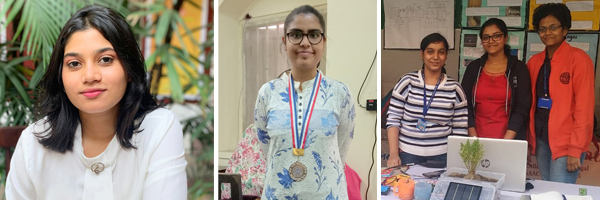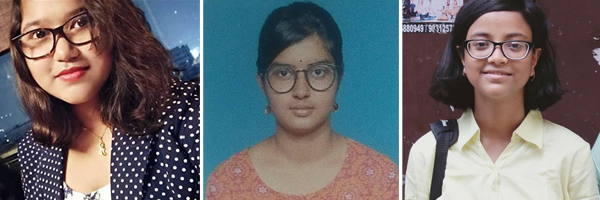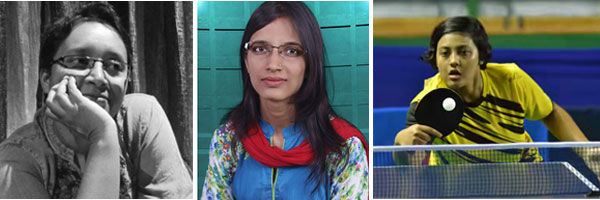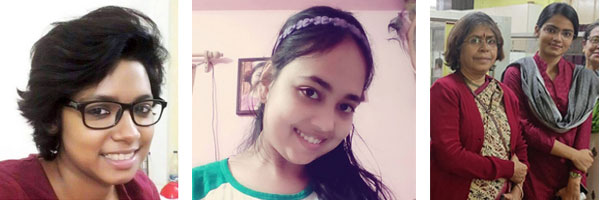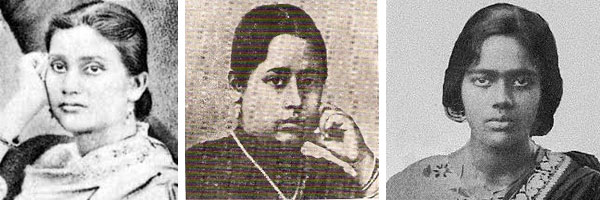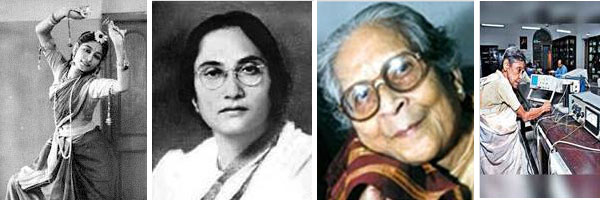Estd. in 1879
First Women's College in Asia
Accreditation
Reaccredited at the 'A' Level by NAAC (Cycle 2), 2015
NIRF Ranking
Bethune College has been placed in the 74th position in the College Category in NIRF ranking (2022). It is the only Government College from West Bengal to feature among the first hundred colleges in the country.
DBT Star College
Received financial support under the DBT Star College Scheme of the Department of Biotechnology, Ministry of Science and Technology, Government of India in 2020
Bethune College Sammilani
Bethune College Sammilani is a symbol of emotion heritage and historical legacy. The century long alumni association is not only a part of history but a myth itself. Visit college alumnae site
Our Illustrious Alumnae [19th Century]
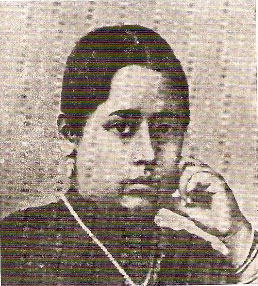
Chandramukhi Bose
(1860-1944)
Educationist & Scholar
Chandramukhi Bose was the first female to pass the Entrance Examination of the University of Calcutta in 1876, though at that time she was not considered as a registered candidate because of wrong interpretation of the regulations for that examination. Only in 2013, the University of Calcutta finally acknowledged Chandramukhi Boseas the first female to have passed the Entrance Examination and conferred on her the degree posthumously. Bethune College Sammilani fought for this recovery. Both Chandramukhi Bose and Kadambini Ganguly (Bose) were students of college classes of Bethune School in 1881 as they were studying for the Degree Examination. In 1883, both Chandramukhi Bose and Kadambini Ganguly passed in the BA examination from the College department of the Bethune School and thus they became first female graduates of the British Colonial empire. Chandramukhi Bose then preferred to continue higher studies in MA and he became the first woman to have passed M.A in English from the University of Calcutta & was highly praised by Pandit Ishwar Chandra Vidyasagar who gifted her a four-volume work of Shakespeare. Chandramukhi started her career as a lecturer in Bethune College in 1886 though it was still part of Bethune School. The College was separated from school in 1888. Chandramukhi Bose became the Principal, thus becoming the first female head of an Under Graduate Academic establishment in South Aisa. Chandramukhi contribution to the women education in the nineteenth century Bengal is still unforgettable. Bethune College Publication Published a book in fond memory and as a mark of respect for her immense work, In the Footsteps of Chandramukhi (1st Edition 2004, 2nd Edition 2019).
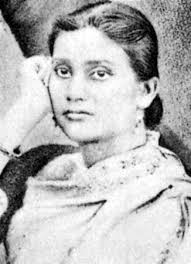
Kadambini Ganguly (Nee Bose)
(1861-1923)
Doctor
Dr. Kadambini Ganguly was the first lady Doctor
of western medicine from Bengal. She is one of the first two female
graduates of the British Colonial Empire. After passing the entrance
examination with flying colours Kadambini Bose continued her
graduation level studies in Bethune College and received her degree
in 1883 along with Chandramukhi Bose. Her success encouraged Bethune
College to introduce F.A. (First Arts) and graduation courses for
women heralding a new era of Women's education not only in India but
also in the entire British Empire Kadambini also became the first
woman to get admission in Bengal Medical College (later renamed as
Calcutta Medical College) in 1884. Next year i.e in 1885 British
Government offered her a scholarship of Rs.20 per month with
retrospective effect. As Kadambini completed her medical course she
was awarded a GBMC (Graduate of Bengal Medical College) degree which
gave her the right to practice. In 1888 Kadambini was appointed as a
Doctor at the Lady Duffrin Women's Hospital at a decent salary of
Rs.300 per month. In 1893, She went to England and acquired triple
degree in Paediatrics, Gynaecology and Surgery from London and
Scottland . After her eloquent speaking in the Medical Conference in
1915 at Calcutta Medical College, the institute revised the policies
to open the doors for female students. Kadambini was included among
the six women in the 1889 Annual Session of Indian National Congress
where She moved a vote of thanks in English and was hailed by Annie
Besant as being 'A symbol that India's freedom will uplift India's
womenhood'. Kadambini Ganguly remained a very active medical
practitioner till the last day of her life. Achievements of
Kadambini Ganguly and Chandramukhi Basu continue to inspire
generations of students of Bethune College.
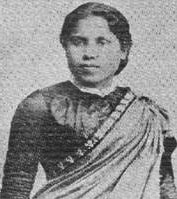
Kamini Roy
(1864-1933)
Poet & Author
Kamini Roy was an eminent poet involved in cultural and social welfare activities, especially women's welfare. Her father, Chandicharan Sen, was a district judge and writer. She was inclined towards literature from very young age and started composing poem from age of eight. She passed FA and earned her BA Honours degree in Sanskrit from Bethune college. She obtained a silver medal for her proficiency in Sanskrit language. She joined Bethune school as a teacher and later joined Bethune College as a professor in the year 1890. She was married to Kedarnath Roy. Her poems were highly appreciated for the calm and restrained expression of deep pathos. An acclaimed poet, her first book of poems, Alo O Chhaya, was published with an introduction by Hemchandra Banerjee in the year 1889. Her other poetical works include Nirmalya, Pauraniki, Gunjan (children's poems), Malya O Nirmalya, Ashoka Sangit and Jibanpathe (two sonnets), Amba (play), Balika Shiksar Adarsha (1918) etc. She was also famous for composing lyrical poetry and she also composed a number of prose. She was a member of the Female Labour Investigation Commission, President of the literary section of the Bengal Literary Conference and Vice President of the Bangiya Sahitya Parishad.

Virginia Mary Mitter
(1865 -1945)
Doctor
Virginia Mary Mitter an Indian Christian was yet another jewel of Bethune College. Later she became a lady doctor after passing out from Calcutta Medical College in 1888. She assisted her husband Dr.P.C. Nandi in treating his female patients, but she never practiced independently because her husband opposed her 'employment' although she was an upper-class lady from a Christian family. Unfortunately, she had to submit to a dominant patriarchy and decline an independent professional life. sadly, not much is known about her childhood except that she was the daughter of a Bengali Christian gentleman Motilal Mitter who was posted in Uttar Pradesh.
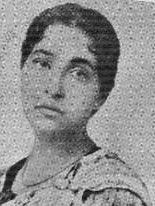
Priyambada Bagchi
(1871-1935)
Poet & Author
Priyambada Bagchi a distinguished litterateur, social worker was a student of F. A. class of Bethune College. She obtained a silver medal for her proficiency in Sanskrit language. Her father was Krishnakumar Bagchi and mother was Prasannamoyee Debi, a well-known writer. Ashutosh Chowdhuri and Pramatha Chaudhury were her maternal uncles. She was married to Taradas Banerjee, a lawyer residing in Madhya Pradesh. He died three years after their marriage. In 1896 Priyambada Devi lost her only son, after which she spent her time writing and engaged in her philanthropic work. She joined the Brahmo Balika Shikshalaya (Brahmo Girl's School) as a teacher. She served as the head of Bharat Stri-Mahamandal. She also worked in a number of educational institutions during this time. She translated Svapnavasavadatta which was a Sanskrit play. She translated parts of the Bible and published it as Bhaktavani. Her notable novels included Women of Japan, Katha O Upakaatha, Jhilejagale Shikar Anath, Pavchulal, and Renuka, a book about Geishas. She also wrote a number of poems including Tara, Angshu, Renu, and Champa O Parul. She directed plays for charity. Her first and perhaps most famous collection of poems Renu was published in 1900. Her poems were highly appreciated for the calm and restrained expression of deep pathos.
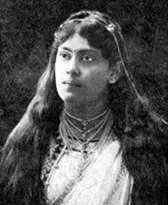
Sarala Devi Chaudhurani
(1872-1945)
Educationist, Social and Political Activist
Sarala Devi Chaudhurani was an educationist, social and political activist. She earned her graduation degree in English literature from Bethune College and received the Padmavati Gold Medal. Her father Janakinath Ghosal was one of the earliest secretaries of the Bengal Congress. Her mother was Swarnakumari Debi, daughter of Debendranath Tagore. Sarala Debi was at the age of twenty-nine when Mahatma Gandhi first saw her conducting an orchestra as it played a song she had written for Congress. She got married to Rambhuj Dutta Chowdhury who was a lawyer and journalist. Although Rabindranath Tagore created the tune of the first two lines of Bande Mataram, it was Sarala Devi who put tune to the rest of the music She sang the nationalist song in her mellifluous voice in the Benaras session of the Congress and contributed widely to its nation-wide popularity. After marriage she got even more involved in political activities and helped her husband in editing the powerful nationalist Urdu weekly newspaper Hindustan. Later when the Rowlatt Act was passed she used the medium to criticize vociferously the Government's stand. She came in touch with Mahatma Gandhi in Lahore and was greatly influenced by his principles of truth and nonviolence. However, in the beginning she was not a supporter of the Congress but was attached to the revolutionary philosophy. She maintained connection with Suhrid Samiti, a secret revolutionary Society. She also took part in the Swadeshi Movement and inspired the women to start using swadeshi products. One of the primary goals of her life was women empowerment. She took it upon herself to educate women and formed the Bharat Stree Mahamandal, first women organization. Subsequently it opened several branches in Lahore, Allahabad, Delhi, Bankura, Calcutta, Hazaribagh etc. Her outfit aimed to develop a system of home education for married girls and helping them have greater access to medical knowledge and medical care. Sarala Devi also rendered valuable service to the cause of Bengali literature and introduced Bir-ashtami Utsav (Festival of Heroes), in which poems with names of heroic men were chanted on the second day of Durga Puja with a view to inspire the youngsters of Bengal with the ideals of heroism. On the top of being a prolific writer Sarala Devi was also the editor of the prestigious journal Bharati.
They Make Us Proud
Some quick example text to build on the card title and make up the bulk of the card's content.
Illustrious Alumna
Illustrious Alumna of Bethune College, Kolkata 19th century- 20th century
